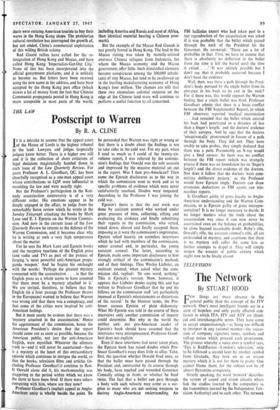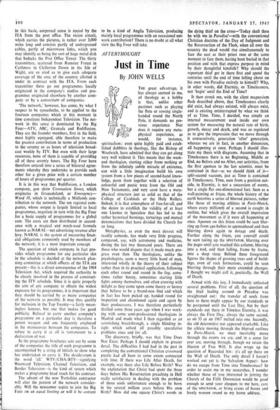The Network
TELEVISION
By STUART HOOD
EW things are more obscure to the r general public than the concept of the ITV network. One's most intelligent friends are in a state of hopeless and only partly affected con- fusion in which ITA, ITV and ATV are identi- cal and interchangeable terms. They have come to accept unquestioningly—as being too difficult to interpret in any rational manner—the succes- sion of company signature tunes, symbols and roll-up noises which proceed each programme. The process whereby a voice over a symbol says, 'This is Rediffusion—London's television,' only to be followed a second later by another symbol from Granada, they look on- as an arcane mystery which it is not for them to probe. One cannot blame them, for the subject can be of almost Byzantine complexity.
Strictly speaking, the word 'network' describes the system of sound and vision circuits which link the studios (owned by the companies) to the transmitters (owned by the Independent Tele- vision Authority) and to each other. The network in this basic, corporeal sense is rented by the ITA from the post office. The vision circuit, which carries the pictures, is rather over 3,000 miles long and consists partly of underground cables, partly of microwave links, which you may identify as being the sort of huge metal dish that bedecks the Post Office Tower. The thirty transmitters, scattered from Rumster Forest in Caithness to Chillerton Down in the Isle of Wight, are so sited as to give each adequate coverage of the area of the country allotted it under its contract with the ITA. From each transmitter there go out programmes locally originated in the company's studios and pro- grammes originated elsewhere by another com- pany or by a consortium of companies.
'The network,' however, has come, by what I suspect to be synecdoche, to be applied to the fourteen companies which at this moment in time constitute Independent Television. The net- work in this sense is dominated by the Big Four—ATV, ABC, Granada and Rediffusion. They are the founder members, first in the field, most highly equipped, able therefore to make the greatest contribution in terms of production to the seventy or so hours of television broad- cast weekly by ITV. But even with their large resources, none of them is capable of providing all of these seventy hours. The Big Four have therefore entered into a series of bilateral agree- ments whereby they undertake to provide each other for a given price with a certain number of hours of programmes per quarter.
It is in this way that Rediffusion, a London company, an show Coronation Street, which originates in Granadaland, or Emergency— Ward 10, which is technically a Midlands con- tribution to the network. The ten regional com- panies, whose output is largely limited to local programmes, negotiate in turn with the Big Four for a basic supply of programmes for a global sum. The costs are then distributed in accord- ance with a magical and much-used formula known as NARAL—net advertising revenue after levy. NARAL is the system of measuring finan- cial obligations commonly used by members of the network; it is a most important concept
The question of which company in fact pro- vides which programme for any particular slot in the schedule is decided at the network plan- ning committee at which officers of the ITA are present—this is a direct consequence of the 1964 Television Act, which required the authority to be closely involved in the process of construct- ing the ITV schedule. Since it is quite properly the aim of any company to obtain the widest exposure for its programmes, it is important that they should be carried by as many companies of the network as possible. It may thus qualify for inclusion in the Top Twenty—a fairly mean- ingless honour, but one that makes for good publicity. Refusal to carry another company's programme on a particular day is therefore a potent weapon and one frequently employed in the manoeuvres between the companies. To refuse to carry it at all is tantamount to a declaration of war.
In the programme brochures sent out by some of the companies the title of each programme is accompanied by a string of initials to show who has undertaken to carry it. The desideratum is the word 'all.' WTV/CHA/BTV—signifying Westward Television, Channel Television, and Border Television—is the kind of return which makes a programme head reach for his contract The advent of the new Yorkshire contractor will alter the pattern of the network consider- ably. Will the newcomer aspire to join the Big Four on an equal footing or will it be content to be a kind of Anglia Television, producing mainly local programmes with an occasional net- work contribution? There is no doubt at all what view the Big Four will take.



































 Previous page
Previous page